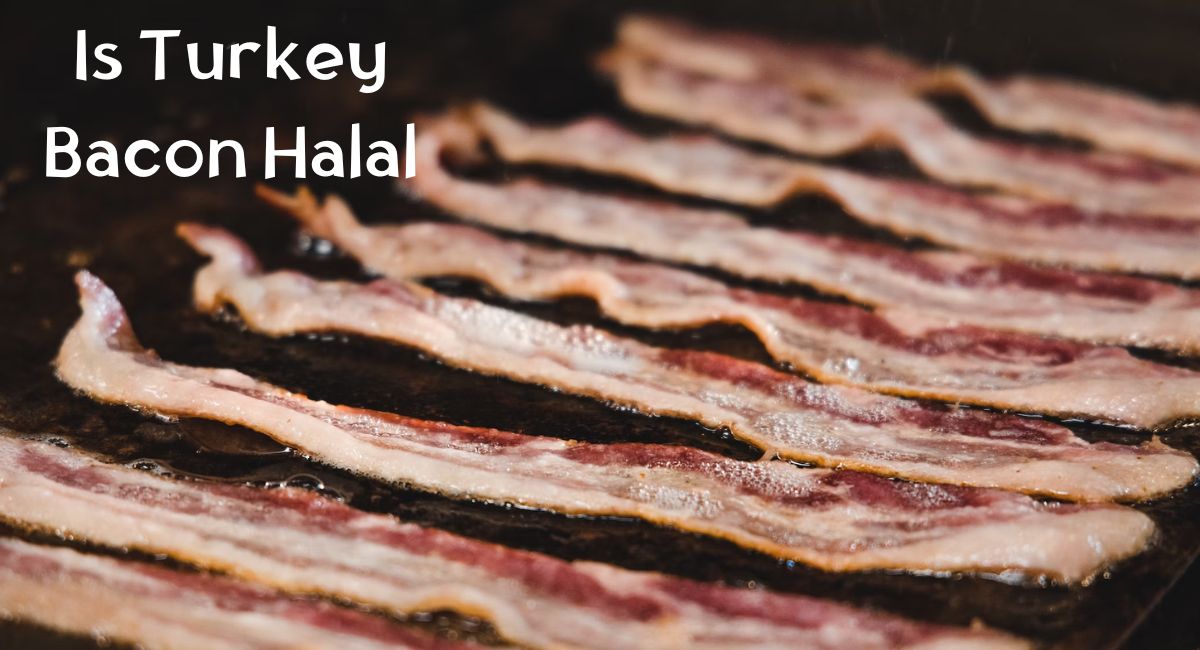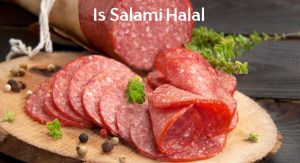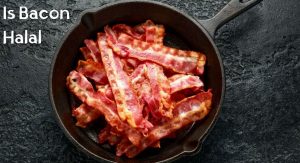Turkey bacon is a popular alternative to pork bacon for those following a halal diet. While Turkey meat is considered halal for Muslims to consume, but the same cannot be said for bacon.
Bacon is typically made from pork, which is strictly prohibited in Islamic dietary law. However, bacon can also be made from other types of meat, such as beef or turkey. This raises the question of whether or not turkey bacon is halal, and if so, under what conditions.
This article will explore the topic of turkey bacon and its status in Islamic dietary law. We will also look at the opinions of Islamic scholars and organizations regarding the consumption of turkey bacon.
Is Turkey Bacon Halal
Turkey bacon is a popular alternative to pork bacon, especially for Muslims who follow halal dietary laws. Halal refers to food and drink that are permissible according to Islamic guidelines. Pork and its by-products are considered haram or forbidden in Islam, hence the need for halal-friendly alternatives such as turkey bacon.
Turkey bacon is made from ground turkey meat that is cured, smoked, seasoned, and sometimes treated with salt. While bacon is usually associated with pork, it can also be made from other meats such as beef or turkey. However, not all turkey bacon is halal, as it depends on how the turkey meat was butchered and processed.
To be considered halal, the turkey meat must be sourced from a halal-certified supplier and butchered in accordance with Islamic guidelines. In addition to the slaughter, the processing of turkey bacon must also adhere to halal standards.
According to Daruliftabirmingham, turkey bacon is generally considered halal to consume since it is made from turkey, which is a halal bird.
It is important to note that not all turkey bacon products are created equal. Some may contain non-halal ingredients or may not have been processed according to Islamic guidelines. Therefore, it is important for Muslims to read the label and check for halal certification before consuming turkey bacon.
Unravel the mystery behind the halal compliance of bacon by delving into our informative article on is Bacon halal. If you’re seeking clarity on the Islamic perspective of consuming bacon and its halal or haram classification, this comprehensive piece is a must-read.
What is Turkey Bacon?
Turkey bacon is a type of meat that has become increasingly popular in recent years, especially among health-conscious individuals. It is a low-fat alternative to traditional pork bacon and is derived from the meat of a turkey. Turkey bacon is often marketed as a halal-friendly alternative to pork bacon for individuals who follow Islamic dietary laws which prohibit the consumption of pork.
While it shares the word “bacon” in its name with its pork-based counterpart, it does not contain any pork products. Instead, it is made from cured, chopped, and smoked turkey meat.
As with any meat product, the halal status of turkey bacon depends on the slaughter process used to obtain the meat. In this article, we will explore the halal status of turkey bacon and the specific guidelines that must be followed to ensure its compliance with Islamic dietary laws.
The Rise of Turkey Bacon’s Popularity
Turkey bacon’s popularity has risen exponentially in recent years due to a focus on healthier eating habits and an increase in religious restrictions on the consumption of pork. This has led to a demand for halal alternatives to pork bacon in Muslim communities.
The world’s largest turkey producer, Butterball LLC, has taken advantage of this trend, expanding its production line for turkey bacon and investing in a $20 million project for its production. Turkey bacon, made from chopped formed cured and smoked turkey, is marketed as a low-fat alternative to pork bacon, containing 68 percent less fat and lower sodium.
Butterball has introduced five varieties of turkey bacon to appeal to consumers, including lower sodium and fully cooked options. The popularity of turkey bacon shows no signs of slowing down, and with increasing health concerns among consumers and religious dietary restrictions, it is expected to continue its expansion as a halal and healthy alternative to traditional bacon.
The Production Process – Making Turkey Bacon
The production process of turkey bacon involves several steps, including slaughtering and butchering, curing, and smoking. Each of these steps plays a crucial role in ensuring that the final product is safe and meets the requirements for halal consumption.
Slaughtering and Butchering
The first step in the production of turkey bacon is the slaughtering and butchering of the turkey. The turkey is first stunned using a captive bolt gun or electric shock, and then its throat is cut with a sharp knife to allow the blood to drain out.
The spinal cord is also severed to ensure that the animal is dead. It is essential to note that the use of stunning and the sharpness of the knife are critical factors in ensuring that the animal dies quickly and painlessly.
After the turkey is slaughtered, it is then butchered into various cuts of meat, including the breast, thigh, and leg. The meat is then trimmed of any excess fat and skin, leaving only the lean meat. The meat is then washed thoroughly to remove any traces of blood.
Curing and Smoking
After the butchering process, the turkey meat is then cured using a mixture of salt, cure, and other seasonings. The curing process helps to preserve the meat and give it a unique flavor. The meat is then left to cure for several hours or days, depending on the recipe.
Once the meat is cured, it is then smoked using a smoker. The smoke helps to add flavor to the meat and also helps to preserve it. The meat is then cooked at a low temperature until it is fully cooked and ready to be packaged.
It is essential to note that halal bacon is made from beef, turkey, duck, or chicken meat that has been slaughtered in accordance with Islamic Shariah. Pork-based bacon is haram and not permissible for Muslims to consume.
Nutritional Value
Turkey bacon is known to be a healthier alternative to pork bacon, with fewer calories and less saturated fat. According to the USDA, two slices of turkey bacon (16g) prepared in the microwave contain 60 calories, 4.2g of fat, 328mg of sodium, 0.7g of carbohydrates, 0g of fiber, 0.7g of sugar, and 4.8g of protein.
Compared to pork bacon, turkey bacon has roughly 25% fewer calories and 35% less saturated fat. This makes it a popular choice for people who are watching their calorie or fat intake. Turkey bacon is also a good source of protein, which is essential for building and repairing muscles.
One of the benefits of turkey bacon is that it contains almost no carbohydrates. Other than added flavorings and preservatives, turkey bacon is 100% meat. This makes it a good choice for people who are trying to reduce their carbohydrate intake or who are following a low-carb diet.
It is important to note that while turkey bacon is a healthier alternative to pork bacon, it still contains sodium and fat. Therefore, it should be consumed in moderation as part of a balanced diet.
Recommended Brands of Halal Turkey Bacon
For those looking for a healthy and halal alternative to pork bacon, there are several recommended brands of halal turkey bacon available in the market.
One popular brand is Deen Halal Turkey Bacon, which is made using quality turkey meat and select wood smoking. It is also gluten-free and contains 75% less fat than traditional pork bacon. This delicious turkey bacon is perfect for a fast breakfast or can be added to salads, egg dishes, and other quick meals.
Another great option is Godshall’s Deen Halal sliced turkey bacon, which is made using chopped turkey thighs and has a lower sodium content than pork bacon. It is also smoked using hardwood and prepared according to Islamic law.
Both brands offer a light and crispy texture and are a healthy alternative to traditional pork bacon.
Other recommended brands of halal turkey bacon include Maple Lodge Farms, Applegate Naturals, and Crescent Foods. These brands offer a great taste and quality ingredients, making them a popular choice for health-conscious consumers.
Conclusion
Turkey bacon is a halal-friendly alternative to pork bacon that has gained popularity in the food industry due to its low-fat content. While eating turkey meat is halal and permissible, the turkey used to make the bacon must be slaughtered in accordance with Islamic law.
Therefore, it is important to ensure that the turkey bacon you consume has undergone halal certification to ensure its compliance with halal guidelines.
The process of smoking and curing the meat to create the bacon-like flavor must also follow all halal compliance protocols to avoid cross-contamination with non-halal consumables.
As such, it is recommended to choose brands of halal turkey bacon that have received official halal certification and are recognized by reputable halal certification bodies. By selecting halal-certified turkey bacon, halal-conscious consumers can enjoy this delicious product without compromising their religious beliefs.
Frequently Asked Questions
1. Is Turkey Bacon healthy?
Compared to pork bacon, turkey bacon has fewer calories, less fat, and less saturated fat. It also contains more Vitamin B12 than pork bacon.
However, turkey bacon is often high in sodium, which can increase the risk of heart disease. It is also a processed meat, which has been linked to increased risk of certain types of cancer. Therefore, it should be consumed in moderation as part of a balanced diet.
2. Is Turkey Bacon already cooked?
Yes, turkey bacon is typically already fully cooked when purchased from the store. Infact, 95% of turkey bacon sold in grocery stores is fully cooked and may even be smoked. However, not every package of turkey bacon is pre-cooked, so it’s essential to check the package label or inspect the bacon’s color and texture to determine if it’s cooked or not. To check if your turkey bacon is fully cooked, look for a change in color. Raw turkey bacon is a pale pink color, but as it cooks, the bacon’s color should darken to a golden brown.
3. Is Turkey Bacon processed?
Yes, Turkey Bacon is considered a processed meat product. Processed meats are meats that have been treated in some way to preserve or flavor them through methods such as salting, curing, fermenting, or smoking. It is important to note that processed meats have been linked to an increased risk of certain cancers, so it is recommended to consume them in moderation.
4. Is Turkey Bacon pork?
No, Turkey Bacon is not pork. Turkey Bacon is a bacon-like product made from seasoned and pressed turkey meat. It is a leaner alternative to traditional pork bacon, with fewer calories, less fat, and lower sodium content than pork bacon. While both turkey bacon and pork bacon are made through a similar process of salt-curing the meat with other seasonings, the former is made using chopped up light and dark turkey meat, as well as the skin. The different parts are combined with seasonings, oil, and preservatives, and then processed to look like bacon.
5. Is Turkey Bacon red meat?
Turkey bacon is not clearly categorized as either red or white meat. In general, red meat refers to meat that comes from mammals such as beef, pork, lamb, and venison, while white meat refers to poultry such as chicken and turkey. However, some cuts of pork and duck are considered gray area meats that could be classified as either red or white. While turkey is a poultry, turkey bacon is a processed meat product that is made from turkey meat and other ingredients such as water, salt, sugar, and preservatives. Therefore, turkey bacon is not a natural form of meat and does not have a clear classification as red or white meat.








